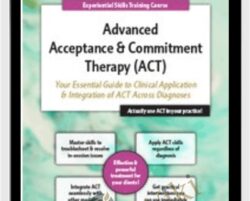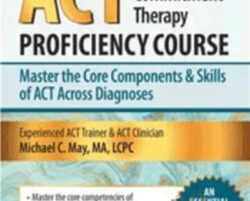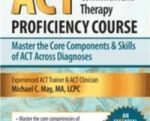This Acceptance and Commitment Therapy (ACT) Proficiency Course recording is essential for any clinician with a difficult-to-treat client on their caseload!ACT has long been established as effective in treating clients with a variety of clinical diagnoses.Now, you can master the core competencies and skills used by ACT clinicians!Watch ACT expert and clinician, Michael C. May, MA, LCPC, and he’ll walk you step-by-step through using the six core processes of Acceptance and Commitment Therapy in session. For each of the six components, you’ll learn interventions and strategies that you can use in your practice immediately.You’ll have plenty of opportunities for practice through in-depth case studies and targeted experiential exercises – allowing you to really hone your skills.Clinicians new to ACT will find this course transparent and easy to understand, while experienced ACT clinicians will discover new, in-depth insights that will solidify comprehension of ACT concepts and expand your repertoire of ACT interventions.Perform a clinical assessment using the Inflexahex diagnostic model to inform clinical treatment interventions.Utilize acceptance exercises in session to increase client willingness to engage in values-consistent behaviors.Analyze the efficacy of mindfulness meditation for clients on a case-by-case basis, and demonstrate alternative mindfulness interventions for clients who find meditation aversive or unhelpful.Utilize clinical strategies to assist clients in clarifying their values as it relates to case conceptualization.Implement clinical treatment interventions, such as behavioral activation strategies or social skills training interventions, to improve client engagement in values-consistent behaviors as an approach to managing symptoms of PTSD, anxiety, personality disorders or depression.Utilize metaphors and exercises to explain self-as-context in session for purposes of client psychoeducation.ACT Foundations: What You Need to KnowContext: Why it is Fundamental to ACTHow to determine the functional purpose of behaviorWhat is language: Relational Frame TheoryThe source of psychological sufferingThe ACT model of psychopathologyExperiential avoidance, cognitive fusion & the toxic cyclePsychological Flexibility: What it is & why it’s importantThe Inflexahex diagnostic modelLimitations of the research & potential risksTHE CORE CONCEPTS OF ACTAcceptance: Combat Experiential AvoidanceWhat is “acceptance” in ACT?Experiential avoidance: The “Control Agenda”Client control over unwanted thoughts & feelingsHow to confront the control agendaInterventions for fostering acceptanceAcceptance Exercises: The “Unwanted Party Guest;” “Barriers to Writing”Defusion: Break Down Thoughts as BarriersThe problem with cognitive fusionWeaken unworkable language functionsShould thoughts always control behavior?Build an environment of defusion within sessionStrategies for building defusion skillsDefusion Exercise: “Having vs Believing” our thoughtsSelf-As-Context: Aid Clients in Distancing Themselves from Their ThoughtsWhat is self-as-context?Self-as-content vs. self-as-contextMitigate attachment to the conceptualized selfHelp clients understand self-as-contextInterventions to foster self-as-contextSelf-As-Context Exercise: The “observer self”Contact with the Present Moment: Mindfulness Strategies to Reduce Worry about the Past & FutureMindfulness: A core feature of all human psychopathologyWhat “mindfulness” means in ACTThe goal of mindfulness practice in ACTHow to train mindfulness with flexibilityOvercome obstacles in teaching mindfulnessAddress relaxation-induced panicFormal & informal mindfulness interventionsContact with the Present Moment Exercise: Mindfulness without MeditationValues: Guide Clients in Identifying & Clarifying What MattersThe importance of values in ACTHow values can be transformative in human behaviorValues & goalsHow to evoke values from clientsFrom instant gratification to pursuit of valuesValues Clarification Exercise: The EulogyCommitted Action: Establish Values-Consistent Patterns of BehaviorThe relationship between values & committed actionWhat’s considered committed action?Address persistent inaction, impulsivity or avoidanceInterventionsExposure-based approachesBehavioral activation strategiesSocial-skills training interventionsProblem-solving barriers to committed actionBehavioral homeworkCase Study: Engaging in committed action with depressionACT in Action: Utilize ACT with Specific Clinical PopulationsPTSDAnxietyPersonality disordersDepressionGet Acceptance & Commitment Therapy (ACT) Proficiency Course… – Michael C. May, Only Price $39Tag: Acceptance & Commitment Therapy (ACT) Proficiency Course… – Michael C. May Review. Acceptance & Commitment Therapy (ACT) Proficiency Course… – Michael C. May download. Acceptance & Commitment Therapy (ACT) Proficiency Course… – Michael C. May discount.
 2-Day Advanced Acceptance & Commitment Therapy: Your Essential Guide to Clinical Application & Integration of ACT Across Diagnoses – Michael C. May
₹10,458.00
2-Day Advanced Acceptance & Commitment Therapy: Your Essential Guide to Clinical Application & Integration of ACT Across Diagnoses – Michael C. May
₹10,458.00
 The Commission Machine – Michael Cheney
₹7,138.00
The Commission Machine – Michael Cheney
₹7,138.00
Acceptance & Commitment Therapy (ACT) Proficiency Course: Master the Core Components & Skills of ACT Across Diagnoses- Michael C. May
₹5,810.00





